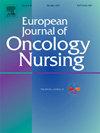症状困扰如何介导妇科癌症患者个体差异与感知可控性之间的关系。
IF 2.7
3区 医学
Q1 NURSING
引用次数: 0
摘要
目的:本研究旨在探讨妇科癌症患者化疗过程中感知可控性的个体差异。我们也检视了症状困扰在个体差异与知觉可控性之间的中介作用。方法:采用目的抽样的横断面研究;数据通过自我报告的问卷收集。总共有170名女性完成了这项调查。采用结构方程模型对提出的症状困扰的中介作用假设进行检验。结论:了解症状困扰在个体差异与感知可控性之间的中介作用,有助于加深对疾病接受机制的认识,对妇科癌症患者的疾病适应具有重要意义。本文章由计算机程序翻译,如有差异,请以英文原文为准。
How symptom distress mediates the relationship between individual differences and perceived controllability among women with gynecologic cancer
Purpose
This study aims to investigate the individual differences in perceived controllability among women with gynecologic cancer who are undergoing chemotherapy. We also examined the mediating effect of symptom distress on the relationship between individual differences and perceived controllability.
Methods
This cross-sectional study employs purposive sampling; data were collected via self-reported questionnaires. In total, 170 women completed the survey. Structural equation modeling was used to examine the proposed hypotheses of the mediating effect of symptom distress.
Results
Results revealed that individual differences in age (r = −0.20, p < .05), education (t = −2.24, p < .05), employment (t = −2.05, p < .05), cancer stage (t = 2.35, p < .05), and number of chemotherapy sessions in the past three months (r = −0.16, p < .05) were significantly associated with perceived treatment control. Physical, but not psychological, symptom distress fully mediated the relationship between individual differences and perceived controllability. Participants who perceived financial distress (β = 0.179, p < .05) and those who had undergone a higher number of chemotherapy sessions within the past three months (β = 0.216, p < .05) experienced greater physical symptom distress. Additionally, those who experienced greater physical symptom distress perceived lower personal control (β = −0.199, p < .05) and treatment control (β = −0.217, p < .05).
Conclusions
Understanding the mediating effects of symptom distress on the relationship between individual differences and perceived controllability can enhance our knowledge of the mechanisms of illness acceptance, which significantly contributes to illness adaptation among women with gynecologic cancer.
求助全文
通过发布文献求助,成功后即可免费获取论文全文。
去求助
来源期刊
CiteScore
4.40
自引率
3.60%
发文量
109
审稿时长
57 days
期刊介绍:
The European Journal of Oncology Nursing is an international journal which publishes research of direct relevance to patient care, nurse education, management and policy development. EJON is proud to be the official journal of the European Oncology Nursing Society.
The journal publishes the following types of papers:
• Original research articles
• Review articles

 求助内容:
求助内容: 应助结果提醒方式:
应助结果提醒方式:


